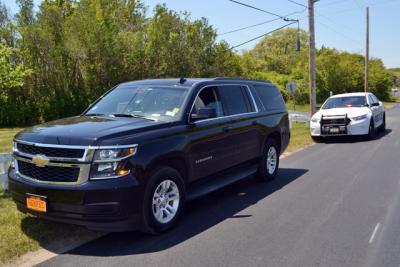Ride Sharing Ban May Be Overruled

With Gov. Andrew Cuomo pushing state legislation that would strip East Hampton Town’s authority to hold Uber car operators to town taxicab regulations — among them car inspections and driver licensing after fingerprinting and background checks — town officials are investigating other solutions to the problems caused by the annual summer influx of out-of-town drivers, who compete with local companies and are sometimes found sleeping in their cars.
The governor favors a proposed law that would oversee Uber and other ride-sharing services summoned through apps, and allow them to operate legally throughout the state. The pending legislation, which is to be attached to a state budget bill, would preclude municipalities from enacting their own local regulations governing the ride services.
“We need to see the details of the bill,” Supervisor Larry Cantwell said Tuesday. “They’re literally writing these bills right now.”
East Hampton Town’s taxi licensing law does not specifically address Uber, but a provision that requires cab companies to have a physical business office in the town in order to obtain town cab permits, and another that requires cars available for hire to be registered to their associated companies, essentially made it impossible for Uber to do business here.
After East Hampton passed the law, Uber mounted a protest campaign among its customers, but the town stuck to its rules, which were developed in response to numerous complaints about chaotic and unsafe situations in the busy summer season.
“This has never been about East Hampton versus Uber,” Mr. Cantwell said Tuesday. “It’s about the practices of Uber drivers, that caused an untenable situation in Montauk. If we could fix those. . . .”
A year ago, when the proposed state legislation was first being discussed, the supervisor wrote to the governor explaining that the vehicle-for-hire industry, including Uber, “profoundly . . . impact[s] our community.” He said that “questionable tactics and actions” of 89 taxi and livery companies operating close to 1,100 licensed vehicles in the town were overwhelming the public safety resources, and cited roadway congestion, use of limited parking, and “literally fighting over fares.” Mr. Cantwell also mentioned “fare gouging, passenger stranding, and driver assaults (of one another and passengers alike). . . .”
The town’s taxicab regulations, the supervisor wrote, “have been very successful,” and were welcomed by the local business community and the public. He asked the governor, should he pursue state regulation, to include provisions against sleeping in vehicles and taking up public parking spaces, and to allow towns to establish their own taxi and limousine commissions to regulate fares.
State Assemblyman Fred W. Thiele Jr. said yesterday that he expected a vote within 48 hours on a budget bill to which the ride-sharing service legislation is attached. It was still being drafted yesterday, he said, but was reportedly to contain three provisions, placing the regulation of ride-sharing services under the state’s Department of Motor Vehicles, bypassing local authority; imposing a 4-percent fee per ride, which would go to the state’s general fund, and revising insurance laws that have curbed the ride-sharing companies’ ability to obtain required coverage.
“If this legislation was stand-alone legislation, I’d vote against it,” Mr. Thiele said. The issue of home rule was contentious, he said, with state senators siding with the governor on regulation of Uber and other companies, and members of the assembly supporting local control. “The Town of East Hampton is a perfect example of the fact that one size does not fit all.”
“This is special-interest politics at its worst,” said Assemblyman Thiele, saying that the proposed law was the result of a “multimillion-dollar lobbying campaign” by Uber.
In light of the expected legislation, Mr. Cantwell said discussions are taking place with town attorneys and other staffers regarding how the town might yet address the influx of Uber drivers here.
“My concern is to keep peace, good order, and protect the health and safety of the people who live here. That’s really the issue,” he said.
